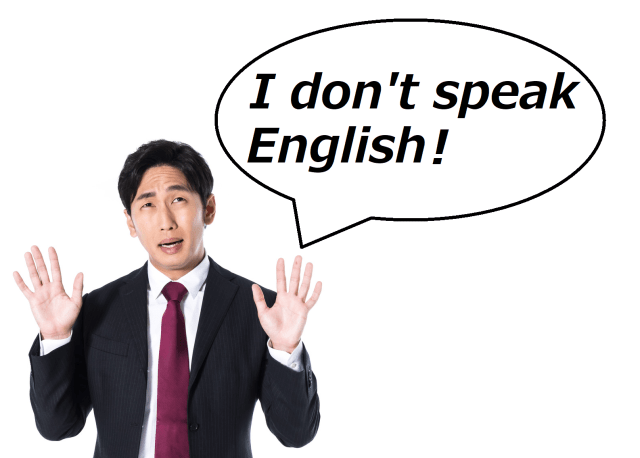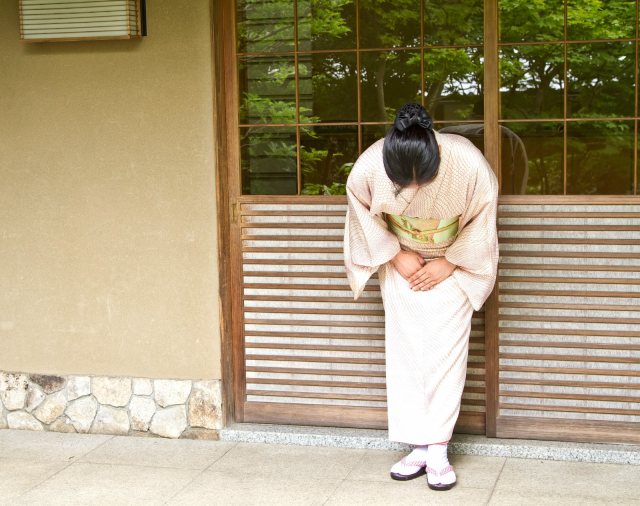
A cutting comeback from a Japanese-proficient foreigner leaves one man with a permanent emotional scar, but there are softer ways to make your point too.
So there’s a situation that just about every foreigner who’s put in the effort to study and learn some Japanese runs into at one point or another in Japan. It basically goes like this:
1. Japanese-proficient foreigner opens their mouth to start speaking, in Japanese, to a Japanese person
2. Japanese person assumes that foreigner must not be able to speak Japanese, and is also a native English-speaker.
3. Japanese person immediately cuts the foreigner off by saying, in English, “I don’t speak English.”
However, when Japanese Twitter user @takah1yt jumped the gun an acted on his assumptions about a foreigner’s language skills, he found himself on the end of a completely unexpected comeback.
【悲報】外国人に話しかけられて、とっさに「I don't speak English!」と言ったら「ベンキョウしろ」と日本語で返されたこのダメージが消えそうにない
— YT(о´ω`о) (@takah1yt) December 21, 2019
“A foreigner was about to start talking to me, so I immediately said I don’t speak English! He responded, in Japanese, with ‘Benkyou shiro.’”
So what’s benkyou shiro mean, in this context?
“Then learn English.”
The beauty of the snarky retort is that it was delivered in Japanese. By speaking in Japanese, the foreigner showed that whether or not @takah1yt could speak English didn’t really have any effect on their ability to communicate with each other. If @takah1yt wanted to suddenly bring up his English skills, and lament them, that’s fine, but that dissatisfaction was entirely on him, since the foreigner wasn’t asking him to use English in the first place. “I don’t think the damage I sustained in that conversation will ever fade,” mused @takah1yt.
It turns out @takah1yt isn’t the only Japanese person to have had their misconception that the foreigner they were talking couldn’t speak Japanese corrected in a sudden and surprising way, as one commenter shared their story.
https://twitter.com/utchie/status/1208583925582352385“When I told a foreigner ‘I can’t speak English,’ they asked, in Japanese, ‘E-, hitokoto mo?’ [Japanese for “Not even a single word?”].”
But why are some Japanese people in such a rush to announce that they can’t speak English, doing so before the foreigner has made any indication that that’s the language they want to converse in? There are a couple of reasons, actually.
First off, in the grand scheme of things, it really wasn’t all that long ago that the Japanese-proficient foreigners were a rarity. That’s no longer the case, with more non-natives now studying and speaking Japanese than at any other time in history, but for the average Japanese person, one who’s not a linguist with their finger on the pulse of language trends, the conception that most foreigners they encounter, even in Japan, can’t speak Japanese is yet to fade, and statistically speaking, might not even be entirely incorrect.
There’s also Japanese culture/society’s strong focus on responsibility and hospitality. Again, permanent foreign residents of Japan are still a rather small minority compared to temporary foreign residents and travelers from abroad. Many Japanese people perceive foreigners in Japan as their society’s guests, and feel a responsibility, and pressure, to accommodate them. Not being able to do so sometimes creates mini panic attacks, which can lead to premature apologies like “I’m sorry I can’t peak English,” since they’ve already played out the scenario of being unable to comply with an English-language request before a request, in any language, has actually been made.
And finally, more than a few Japanese people are embarrassed about their lack of English skills. Among developed nations, Japan’s English proficiency is comparatively low, and a sense of preemptive shame can mix with anxiety to cause Japanese people to blurt out “I can’t speak English!” at the earliest possible moment.
Of course, those reasons don’t necessarily mean that’s the right way to be handling the situation, and another commenter had a much more logical, and respectful, way of dealing with the linguistic issue.
自分が警備員やってた時、観光施設近く(の駐車場入口)で色々な人種の人に道を聞かれましたが、頑張って日本語で受け答えできる人もけっこう居るので、正しい応答は「はい、どうしましたか?」と『まず日本語で聞き返す』事ですネ。(-_-)
— guldeen(五十肩悶絶中) (@guldeen) December 22, 2019
“I used to work as a security guard at a parking lot near a sightseeing destination, and people of many different ethnicities would ask me for directions. A lot of them have studied hard and can communicate in Japanese, so the correct thing to do is to first speak to them in Japanese, and ask ‘Hai, dou shimashita ka?’ [“What can I do for you?”].”
Meanwhile, if you’d like to know what you, as a Japanese-speaking foreigner, can do to get the conversation back on track, the best way to respond to a premature “I can’t speak English!” is with a calm “Dakara watashi ha Nihongo de ii desu yo” (“And that’s why it’s OK to speak to me in Japanese.”). Sure, it’s sometimes kind of a pain to have to add that extra step to the conversational process, but maybe after getting that response a few times, the Japanese person will learn to hold off on their “I can’t speak English!” until they’ve actually listened to the words coming out of the foreigner’s mouth.
Source: Twitter/@takah1yt via Jin
Top image: Pakutaso (edited by SoraNews24)
Insert images: Pakutaso (1, 2)
● Want to hear about SoraNews24’s latest articles as soon as they’re published? Follow us on Facebook and Twitter!
Feel free to follow Casey on Twitter and talk to him in English or Japanese.



 Westerners in Japan – do they really ALL speak English? 【Video】
Westerners in Japan – do they really ALL speak English? 【Video】 Japanese expat remembers the words that changed his life when he started working in Australia
Japanese expat remembers the words that changed his life when he started working in Australia Japanese Twitter user embarrassed to learn why American friend is studying Japanese, not Chinese
Japanese Twitter user embarrassed to learn why American friend is studying Japanese, not Chinese English conversation school in Japan has clever reminder that students don’t have to be perfect
English conversation school in Japan has clever reminder that students don’t have to be perfect Foreign English teacher in Japan calls student’s ability garbage, says it was an “American joke”
Foreign English teacher in Japan calls student’s ability garbage, says it was an “American joke” Foreigner’s request for help in Tokyo makes us sad for the state of society
Foreigner’s request for help in Tokyo makes us sad for the state of society Japanese city loses residents’ personal data, which was on paper being transported on a windy day
Japanese city loses residents’ personal data, which was on paper being transported on a windy day Seaside scenery, history, and so many desserts on Yokohama’s Akai Kutsu【Japan Loop Buses】
Seaside scenery, history, and so many desserts on Yokohama’s Akai Kutsu【Japan Loop Buses】 Should you add tartar sauce to Japanese curry rice? CoCo Ichi makes diners an unusual offer
Should you add tartar sauce to Japanese curry rice? CoCo Ichi makes diners an unusual offer Japan’s summertime towelket pillowcases are even better with the addition of Ghibli stars【Photos】
Japan’s summertime towelket pillowcases are even better with the addition of Ghibli stars【Photos】 Mt. Koya planning to instate visitor’s tax to cope with huge tourist numbers
Mt. Koya planning to instate visitor’s tax to cope with huge tourist numbers Akihabara pop-up shop sells goods made by Japanese prison inmates
Akihabara pop-up shop sells goods made by Japanese prison inmates French Fries Bread in Tokyo’s Shibuya becomes a hit on social media
French Fries Bread in Tokyo’s Shibuya becomes a hit on social media Ghibli Park now selling “Grilled Frogs” from food cart in Valley of Witches
Ghibli Park now selling “Grilled Frogs” from food cart in Valley of Witches Red light district sushi restaurant in Tokyo shows us just how wrong we were about it
Red light district sushi restaurant in Tokyo shows us just how wrong we were about it McDonald’s new Happy Meals offer up cute and practical Sanrio lifestyle goods
McDonald’s new Happy Meals offer up cute and practical Sanrio lifestyle goods Japanese ramen restaurants under pressure from new yen banknotes
Japanese ramen restaurants under pressure from new yen banknotes Studio Ghibli releases new action figures featuring Nausicaä of the Valley of the Wind characters
Studio Ghibli releases new action figures featuring Nausicaä of the Valley of the Wind characters New private rooms on Tokaido Shinkansen change the way we travel from Tokyo to Kyoto
New private rooms on Tokaido Shinkansen change the way we travel from Tokyo to Kyoto Tokyo Tsukiji fish market site to be redeveloped with 50,000-seat stadium, hotel, shopping center
Tokyo Tsukiji fish market site to be redeveloped with 50,000-seat stadium, hotel, shopping center Beautiful Ghibli sealing wax kits let you create accessories and elegant letter decorations【Pics】
Beautiful Ghibli sealing wax kits let you create accessories and elegant letter decorations【Pics】 Studio Ghibli releases Kiki’s Delivery Service chocolate cake pouches in Japan
Studio Ghibli releases Kiki’s Delivery Service chocolate cake pouches in Japan New definition of “Japanese whiskey” goes into effect to prevent fakes from fooling overseas buyers
New definition of “Japanese whiskey” goes into effect to prevent fakes from fooling overseas buyers Our Japanese reporter visits Costco in the U.S., finds super American and very Japanese things
Our Japanese reporter visits Costco in the U.S., finds super American and very Japanese things All-you-can-drink Starbucks and amazing views part of Tokyo’s new 170 meter-high sky lounge
All-you-can-drink Starbucks and amazing views part of Tokyo’s new 170 meter-high sky lounge More foreign tourists than ever before in history visited Japan last month
More foreign tourists than ever before in history visited Japan last month New Pokémon cakes let you eat your way through Pikachu and all the Eevee evolutions
New Pokémon cakes let you eat your way through Pikachu and all the Eevee evolutions Disney princesses get official manga makeovers for Manga Princess Cafe opening in Tokyo
Disney princesses get official manga makeovers for Manga Princess Cafe opening in Tokyo Sales of Japan’s most convenient train ticket/shopping payment cards suspended indefinitely
Sales of Japan’s most convenient train ticket/shopping payment cards suspended indefinitely Sold-out Studio Ghibli desktop humidifiers are back so Totoro can help you through the dry season
Sold-out Studio Ghibli desktop humidifiers are back so Totoro can help you through the dry season Japanese government to make first change to romanization spelling rules since the 1950s
Japanese government to make first change to romanization spelling rules since the 1950s Ghibli founders Toshio Suzuki and Hayao Miyazaki contribute to Japanese whisky Totoro label design
Ghibli founders Toshio Suzuki and Hayao Miyazaki contribute to Japanese whisky Totoro label design Doraemon found buried at sea as scene from 1993 anime becomes real life【Photos】
Doraemon found buried at sea as scene from 1993 anime becomes real life【Photos】 Tokyo’s most famous Starbucks is closed
Tokyo’s most famous Starbucks is closed One Piece characters’ nationalities revealed, but fans have mixed opinions
One Piece characters’ nationalities revealed, but fans have mixed opinions We asked a Uniqlo employee what four things we should buy and their suggestions didn’t disappoint
We asked a Uniqlo employee what four things we should buy and their suggestions didn’t disappoint Princesses, fruits, and blacksmiths: Study reveals the 30 most unusual family names in Japan
Princesses, fruits, and blacksmiths: Study reveals the 30 most unusual family names in Japan What’s wrong with English education in Japan? Pull up a chair…
What’s wrong with English education in Japan? Pull up a chair… The Japanese you learn at school vs the Japanese used in Japan【Video】
The Japanese you learn at school vs the Japanese used in Japan【Video】 Seven mistakes foreigners make when speaking Japanese—and how to fix them
Seven mistakes foreigners make when speaking Japanese—and how to fix them North Japan prefecture creates guide to help new foreign workers understand local language quirks
North Japan prefecture creates guide to help new foreign workers understand local language quirks Over half of Japanese students in nationwide test score zero percent in English speaking section
Over half of Japanese students in nationwide test score zero percent in English speaking section When “yes” means “no” — The Japanese language quirk that trips English speakers up
When “yes” means “no” — The Japanese language quirk that trips English speakers up Did Starbucks Japan forget to translate this important food allergen warning?
Did Starbucks Japan forget to translate this important food allergen warning? Japanese woman stumbles on the power of the infamous “gaijin seat” phenomenon during flight
Japanese woman stumbles on the power of the infamous “gaijin seat” phenomenon during flight “But we’re speaking Japanese!”: Humorous video confronts lingering stereotypes in Japan
“But we’re speaking Japanese!”: Humorous video confronts lingering stereotypes in Japan Foreign worker in Japan fends off armed robber with single word, gets no respect from local media
Foreign worker in Japan fends off armed robber with single word, gets no respect from local media Convenience store in Sendai celebrates its foreign workers with a special store display
Convenience store in Sendai celebrates its foreign workers with a special store display Naomi Osaka shuts down reporter who asked her to speak in Japanese following Australian Open win
Naomi Osaka shuts down reporter who asked her to speak in Japanese following Australian Open win RocketNews24’s six top tips for learning Japanese
RocketNews24’s six top tips for learning Japanese Foreign shop clerk and Japanese customer fail to communicate because of Japanese language quirk
Foreign shop clerk and Japanese customer fail to communicate because of Japanese language quirk Japanese people give their thoughts on Gaijin Hunters/English Vampires
Japanese people give their thoughts on Gaijin Hunters/English Vampires
Leave a Reply